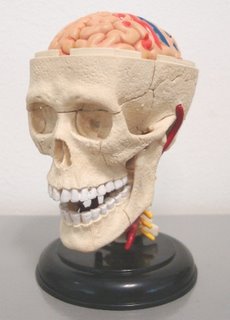 After Plato, another philosopher's idea was to become a major setback to the development of modern scientific thinking.
After Plato, another philosopher's idea was to become a major setback to the development of modern scientific thinking.In the mid-17th century, French philosopher René Descartes proposed an idea called Dualism.
To explain it simply: Descartes believed that the body is like a machine that follows the laws of physics, whereas the mind (or soul) is non-material and does not follow the laws of physics.

The pineal gland links the physical body with the non-material soul.
Since the soul does not exist in the physical Universe, it can only be examined via supernatural methods.
On the good side, Duality officially allowed scientific studies on the body (which before Descartes' time was considered to be sacred and cannot be dissected), leading to important discoveries that tell us how our bodies work.
On the bad side, it helped to discourage scientific studies into the human mind for about two hundred years.
Things only started to improve towards the end of the 19th century, with the rise of the new science of psychology.
One early idea in psychology that is important to this real-virtual discussion is the concept of Gestalt. This can be summarized as "the whole is greater than the sum of its parts".
Gestalt psychologists observed that we don't always arrive at the overall meaning of something by looking at its components one by one.

Just like how this dog suddenly appears out of the background noise of black blobs - sometimes we see the meaning all at once, as a whole.
New properties that cannot be predicted by studying the components alone are called emergent properties. Emergent properties tend to be processes rather than physical things.
Gestalt psychologists described this phenomenon of emergence, but they could not explain it.
Enter systems biology.
In the 1960s, Austrian-born biologist Ludwig von Bertalanffy wrote General Systems Theory, where he proposed that living organisms are complex, open systems.

Unlike a simple system, where you can learn about its overall properties by studying each component in detail, a complex system does not have additive, easily predicted properties.
This is because a complex system has many strong, non-linear interactions between its components. Many of these components are organized in feedback and feedforward loops that affect the function of other components.
A complex system often has multiple levels of organization, each level regulating the activity of lower organization levels and becoming a component of a higher organization level.
Higher organization levels can have emergent properties which are meaningless at lower levels.
In addition, living organisms are also open systems, which means that they are constantly interacting with the external environment. So the emergent properties of organisms also depend on where they situated.
Thus the overall explanation is:
The "mind" is what the brain does, like "spell" is what a school kid does.
You cannot find a "spell" in the cells of a person, but without cells there can be no "spell".
Similarly you cannot find an Internet in a computer chip, but without computer chips there can be no Internet.
Complex systems have emergent, "virtual" functions that feel far more real than the physical components that make it.
And in the case of multiplayer online games, the computer's virtual reality can become so real and so attractive that some people have become hopelessly addicted to it.
Trading one virtual reality for another.
To the extent that they could neglect their physical lives and even kill themselves.
Online games, the entertainment industry, alternative medicine practitioners and motivational speakers all try to sell a "virtual" world that appears more real, more ideal, and more wonderful than physical reality.
It's hardly surprising that they are so popular.
Even I find the world of video games incredibly engaging.
Heh.
Unfortunately, the truth remains...
When somebody dies, so does the person on the other side of the mirror.
Would you like to know more?
- What is Systems Theory?






0 Comments:
Post a Comment